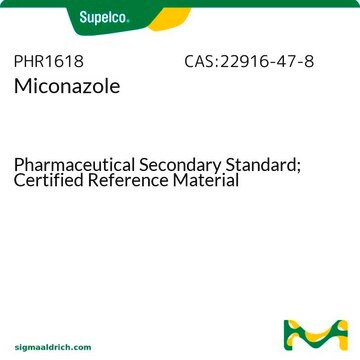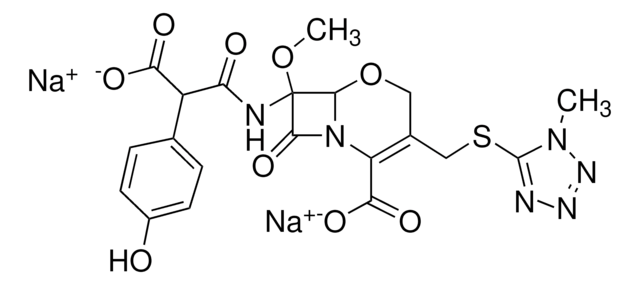M3512
(±)-Miconazole nitrate salt
imidazole antibiotic
Synonym(s):
1-(2,4-Dichloro-β-[(2,4-dichlorobenzyl)oxy]phenethyl)imidazole
About This Item
Recommended Products
Quality Level
optical activity
[α]/D ±0.10° (Specific Rotation (BP))
color
white to off-white
antibiotic activity spectrum
fungi
mycobacteria
Mode of action
enzyme | inhibits
SMILES string
ClC1=CC(Cl)=CC=C1C(OCC2=CC=C(Cl)C=C2Cl)CN3C=CN=C3.[O-][N+](O)=O
InChI
1S/C18H14Cl4N2O.HNO3/c19-13-2-1-12(16(21)7-13)10-25-18(9-24-6-5-23-11-24)15-4-3-14(20)8-17(15)22;2-1(3)4/h1-8,11,18H,9-10H2;(H,2,3,4)
InChI key
MCCACAIVAXEFAL-UHFFFAOYSA-N
Looking for similar products? Visit Product Comparison Guide
Related Categories
General description
Application
Biochem/physiol Actions
Preparation Note
Signal Word
Warning
Hazard Statements
Precautionary Statements
Hazard Classifications
Acute Tox. 4 Oral - Skin Sens. 1
Storage Class Code
11 - Combustible Solids
WGK
WGK 3
Flash Point(F)
Not applicable
Flash Point(C)
Not applicable
Personal Protective Equipment
Certificates of Analysis (COA)
Search for Certificates of Analysis (COA) by entering the products Lot/Batch Number. Lot and Batch Numbers can be found on a product’s label following the words ‘Lot’ or ‘Batch’.
Already Own This Product?
Find documentation for the products that you have recently purchased in the Document Library.
Customers Also Viewed
Chromatograms
application for HPLCapplication for HPLCapplication for HPLCOur team of scientists has experience in all areas of research including Life Science, Material Science, Chemical Synthesis, Chromatography, Analytical and many others.
Contact Technical Service












